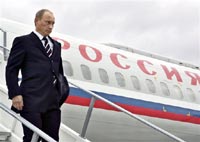Russian President arrives in Iran despite assassination warning
Russian President Vladimir Putin arrived in Tehran on Tuesday for a historic visit to hold talks on Iran's nuclear program and attend a Caspian sea summit.

The visit, the first by a Kremlin leader since World War II, is taking place despite warnings of a possible assassination plot and amid hopes that a round of personal diplomacy could help offer a solution to an international standoff on Iran's nuclear program.
Putin's trip was thrown into doubt when the Kremlin said Sunday that he had been informed by Russian special services that suicide attackers might try to kill him in Tehran, but he shrugged off the warning Monday during a visit to Germany.
"Of course I am going to Iran," he said after talks with German Chancellor Angela Merkel. "If I always listened to all the various threats and the recommendations of the special services I would never leave home."
The remark played into the carefully crafted image of a fearless leader that Putin has cultivated, and also appeared aimed at emphasizing that he is in control - not under undue influence from security officials - as he maneuvers to maintain influence after his presidential term ends next year.
Iranian Foreign Ministry spokesman Mohammad Ali Hosseini dismissed reports about the purported assassination plot as disinformation spread by adversaries hoping to spoil good relations between Russia and Iran.
Putin has warned the U.S. and other nations against trying to coerce Iran into reining in its nuclear program and insists peaceful dialogue is the only way to deal with Tehran's defiance of a U.N. Security Council demand that it suspend uranium enrichment.
"Threatening someone, in this case the Iranian leadership and Iranian people, will lead nowhere," Putin said in Germany. "They are not afraid, believe me."
Iran's rejection of the council's demand and its previous clandestine atomic work has fed suspicions in the U.S. and other countries that Tehran is working to enrich uranium to a purity usable in nuclear weapons. Iran insists it is only wants lesser-enriched uranium to fuel nuclear reactors that would generate electricity.
Putin's visit to Tehran, the first such trip by a Kremlin leader since Josef Stalin attended a 1943 wartime summit with Winston Churchill and Franklin D. Roosevelt, is being closely watched for any possible shifts in Russia's carefully hedged stance in the nuclear standoff.
The Russian president underlined his disagreements with Washington last week, saying he saw no "objective data" to prove Western claims that Iran is trying to construct nuclear weapons.
Russia, which is building Iran's first nuclear power plant, has resisted the push by the U.S. and its allies for stronger U.N. sanctions against Tehran and strongly warned Washington against using force.
"Putin's trip to Tehran is a show of Russia's independence in global affairs. Putin, who approaches the end of his term, wants to demonstrate that he wouldn't cave in to the U.S. pressure," said Alexander Pikayev, an expert on Iran with Russia's Institute for World Economy and International Relations.
Subscribe to Pravda.Ru Telegram channel, Facebook, RSS!


